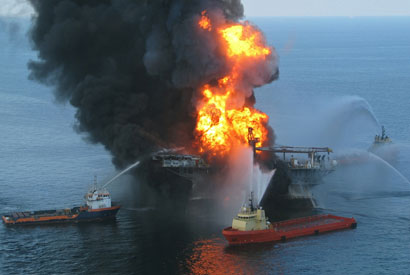Media Advisory: How Deepwater Horizon is linked to other disasters
Robert Bea, an expert witness in the ongoing civil trial to determine the causes of BP's oil rig blowout in 2010 in the Gulf of Mexico, will discuss the common threads linking Deepwater Horizon to other major engineering disasters.

April 11, 2013
ATTENTION: Reporters covering engineering, city planning
WHAT: “Deepwater Horizon: Connecting the Dots in Disasters,” a talk by Robert Bea, professor of civil engineering at the University of California, Berkeley. Bea is an expert witness in the ongoing civil trial to determine the causes of BP’s oil rig blowout in 2010 in the Gulf of Mexico.
The talk, sponsored by UC Berkeley’s Center for Catastrophic Risk Management (CCRM), will cover Bea’s investigation into the events leading up to the explosion that killed 11 crewmen and caused the largest offshore oil spill in U.S. history.
While the talk will focus on the Deepwater Horizon event, Bea will also discuss how the Gulf oil spill exemplifies systemic problems he has seen in other disasters, including the 2005 New Orleans levee failure during Hurricane Katrina and the 2010 San Bruno, Calif., explosion of a Pacific Gas & Electric pipeline.
“We also have a ticking time bomb in California, and it’s called the Delta,” said Bea, referring to the Sacramento-San Joaquin River Delta, the estuary hub for aqueducts that channel drinking water to two-thirds of the state’s population. “There is a common thread, and lessons in these disasters should be applied to the Delta.”
WHEN: 10 a.m. – noon, Wednesday, April 17 (includes audience Q&A)
WHERE: 247 Cory Hall, UC Berkeley (campus map available online)
WHO: Robert Bea has more than 50 years of experience in engineering and management of design, construction, maintenance, operation and decommissioning of engineered systems, including offshore platforms, pipelines and floating facilities. Before coming to UC Berkeley, he worked as a consultant with BP on the topic of risk assessment and management. He also worked with the U.S. Army Corps of Engineers, Shell Oil, Shell Development and Royal Dutch Shell companies in a variety of engineering, construction, operations and research assignments.
Bea has conducted research on numerous disasters, such as the 1988 Piper Alpha oil platform explosion in the North Sea, the 1989 Exxon Valdez oil tanker spill in Alaska’s Prince William Sound, the 2003 disintegration of the Columbia Space Shuttle, and the 2005 failure of the flood protection system for the Greater New Orleans area during Hurricane Katrina.
DETAILS: CCRM was formed in 2005 in response to the Hurricane Katrina tragedy. It consists of academic researchers and practitioners in the fields of engineering, social science, medicine, public health, public policy and law. The center shares its expertise with industry and government in an effort to influence change.